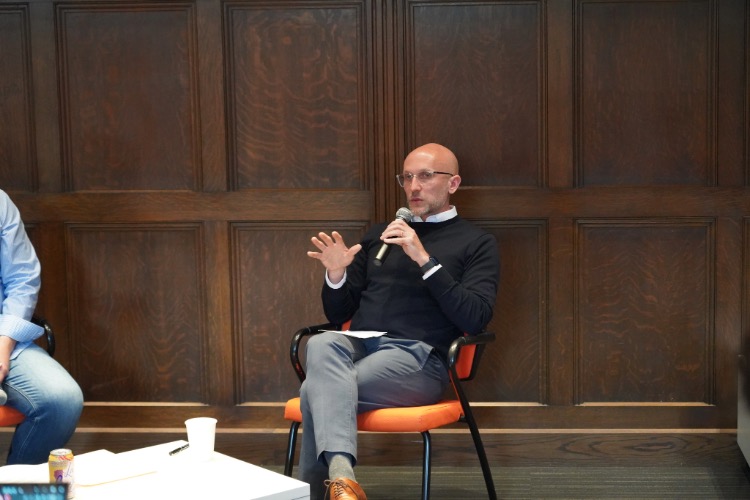
On Thursday, April 13th, 2024, the Young Initiative at Occidental College hosted a talk by Dr. Benjamin Brake, the Director of the Office of Cyber Affairs and Emerging Technology at the U.S. Department of State's Bureau of Intelligence and Research.
On Thursday, April 13th, 2024, Dr. Benjamin Brake, the Director of the Office of Cyber Affairs and Emerging Technology at the U.S. Department of State's Bureau of Intelligence and Research, delivered an engaging presentation at Choi Auditorium. As an expert in his field, he provided insightful perspectives on the critical role of cybersecurity and emerging technologies in modern diplomacy. In an engaging conversation with DWA Professor Igor Logvinenko, Dr. Brake explored the challenges and opportunities that arise from the ever-evolving digital landscape, emphasizing the importance of proactive measures to safeguard national interests while fostering international cooperation. His remarks highlighted the State Department's efforts to stay ahead of the curve and harness technological advancements to enhance diplomatic strategies and strengthen global partnerships.
In his role, Dr. Brake relays complex cyber-related information to policymakers, thereby informing their diplomatic actions. Some of these cyber-related issues include cybercrime and the digital norms of appropriate behavior during peacetimes. Dr. Brake highlighted the collaborative aspect of his work, praising policymakers and diplomats for their ability to process the complexities of cybersecurity to effectively advance U.S. interests. He emphasized the value of clear and concise communication when briefing diplomats on these complexities. This enables them to make informed and timely decisions that balance the values, economic interests, and security of the U.S.
In his discussion, Dr. Brake recognized the benefits and challenges of the U.S. cyber-system compared to those of other countries. While the openness of the U.S. system fosters a more dynamic digital landscape with rapid advancements, this landscape is more vulnerable to malicious attacks as there are more actors involved at each level. He provided his audience with the geopolitical implications of three emerging technologies: semiconductors, artificial intelligence, and green technologies. One observation was constant across all three technologies: the potential for malicious interference exists, regardless of the beneficial potential of the technology. To mitigate these threats, Dr. Brake advocated for strong network security, grid reliability, and data integrity. To conclude his talk with the Oxy community, Dr. Brake connected his work to his liberal arts education at Vassar College, which taught him that “familiarity with difference is essential for finding similarity – which is what diplomacy is.”
